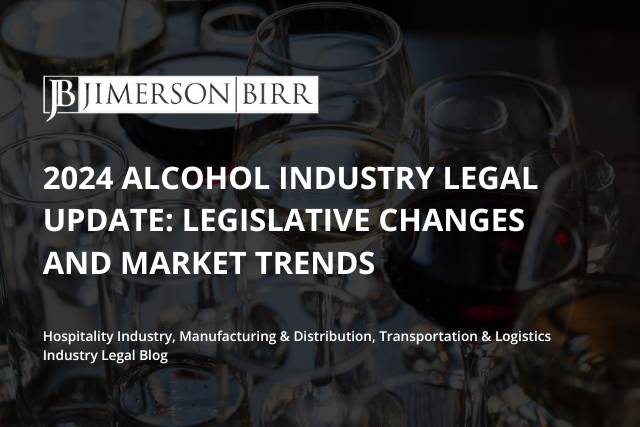The alcohol beverage industry experienced significant regulatory evolution in 2024, with Florida leading substantial legislative changes while national trends reshape market dynamics.
Florida’s Expanding Wine Market
Florida’s wine industry, contributing over $15 billion annually to the state’s economy and ranking second only to California in production, marked a milestone with new legislation expanding retail capabilities. Governor Ron DeSantis’s signing of HB 583 enables retailers to sell wine bottles up to 15 liters starting July 1, lifting previous restrictions that limited container sizes to 1 gallon.
“We want our consumers to be happy. And if that means they want to buy and sell a big ole bottle of wine like this, then by golly, they’re going to be able to do that in the State of Florida,” stated Governor DeSantis upon signing the bill.
The state’s 104 wine producers anticipate market growth from this change. Particularly, the larger sized bottles are already in high demand for weddings and special occasion events.
Florida’s Additional Alcohol Legislation
Florida enacted several other significant changes to its alcohol regulations in 2024:
- In-Store Servicing Expansion: CS/HB 709 now permits distributors to provide in-store servicing for all liquor products, expanding beyond previously permitted beer and wine categories. This change forces distributors to enhance their service offerings to maintain competitiveness.
- Enhanced Penalties: SB 1090 established new felony violations for unauthorized alcohol sales at commercial establishments, with fines ranging from $5,000 to $20,000 for repeat offenses. This creates a clearer distinction between penalties for commercial and non-commercial violations.
- Digital Modernization: The Department of Business and Professional Regulation now requires licensees to maintain online accounts and process applications electronically, though implementation challenges persist with the current system.
National Industry Developments
Direct-to-Consumer Shipping Evolution:
The trend toward expanded direct-to-consumer shipping continued gaining momentum in 2024. New York’s groundbreaking legislation permitting direct shipping of cider, spirits, and mead exemplifies this shift, particularly benefiting smaller producers seeking market expansion. However, businesses must navigate varying state regulations regarding shipping, licensing, and tax obligations.
Enhanced Regulatory Oversight:
Regulators intensified scrutiny of health claims, calorie counts, and ingredient transparency on alcohol labels. The Alcohol and Tobacco Tax and Trade Bureau’s (TTB) 2024 guidance on social media usage established clearer boundaries for digital marketing strategies, particularly regarding underage consumer protection. Marketing practices, especially on social media platforms, face stricter oversight to prevent misleading claims and ensure responsible advertising.
Sustainability and Environmental Compliance:
Environmental regulations increasingly impact industry operations, with new requirements for eco-friendly packaging and waste reduction. Businesses promoting sustainability must provide substantial evidence supporting their environmental claims, potentially affecting operational costs and practices.
Low-Alcohol and Non-Alcoholic Beverage Market:
The growing market for low- and non-alcoholic beverages prompted regulatory attention to production methods and labeling standards. Producers entering this space must navigate specific requirements governing alcohol content, production processes, and product labeling.
Organic Certification Changes:
The USDA and National Organic Program implemented stricter guidelines for organic alcohol imports in 2024, requiring enhanced documentation and verification procedures. Importers must now provide comprehensive evidence of compliance with U.S. organic standards, affecting international trade relationships and certification processes.
Labor Law Compliance:
The industry faces increased attention to labor practices, particularly in tasting rooms and hospitality operations. Businesses must ensure compliance with evolving regulations regarding overtime, wages, and workplace safety standards.
Looking Ahead
As the alcohol beverage industry continues evolving, businesses must adapt to changing consumer preferences while navigating complex regulatory requirements. Success requires:
- Maintaining compliance with varying state and federal regulations
- Adapting to stricter environmental and sustainability standards
- Understanding and implementing new digital marketing guidelines
- Preparing for expanded direct-to-consumer opportunities
- Ensuring proper documentation for organic certification
- Managing labor compliance in hospitality operations
The industry’s trajectory suggests 2025 will bring further developments in direct-to-consumer shipping, digital marketing regulations, and environmental compliance requirements. Businesses should regularly review their practices to ensure alignment with current regulations while preparing for future changes in the legal landscape.
With states like Florida leading significant legislative changes and national trends reshaping market dynamics, the alcohol beverage industry continues its transformation. Success in this evolving landscape requires careful attention to compliance requirements while maintaining operational efficiency and meeting changing consumer demands.

